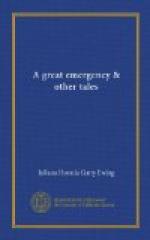The thought of Baby Cecil was the heaviest pang I felt when I was dissatisfied with the idea of running away from home. Baby Cecil was the pet of the house. He had been born after my father’s death, and from the day he was born everybody conspired to make much of him. Dandy, the Scotch terrier, would renounce a romping ramble with us to keep watch over Baby Cecil when he was really a baby, and was only carried for a dull airing in the nursemaid’s arms. I can quite understand Dandy’s feelings; for if when one was just preparing for a paperchase, or anything of that sort, Baby Cecil trotted up and, flinging himself head first into one’s arms, after his usual fashion, cried, “Baby Cecil ’ants Charlie to tell him a long, long story—so much!” it always ended in one’s giving up the race or the scramble, and devoting one’s self as sedately as Dandy to his service. But I consoled myself with the thought of how Baby Cecil would delight in me, and what stories I should be able to tell him on my return.
The worst of running away now-a-days is that railways and telegrams run faster. I was prepared for any emergency except that of being found and brought home again.
Thinking of this brought to my mind one of Fred’s tales of the captain, about how he was pursued by bloodhounds and escaped by getting into water. Water not only retains no scent, it keeps no track. I think perhaps this is one reason why boys so often go to sea when they run away, that no one may be able to follow them. It helped my decision that we would go to sea when we ran away, Fred and I. Besides, there was no other road to strange countries, and no other way of seeing the sea people with the sou’-wester heads.
Fred did not seem to have any scruples about leaving his home, which made me feel how much braver he must be than I. But his head was so full of the plans he made for us, and the lists he drew up of natural products of the earth in various places on which we could live without paying for our living, that he neglected his school-work, and got into scrapes about it. This distressed me very much, for I was working my very best that half on purpose that no one might say that we ran away from our lessons, but that it might be understood that we had gone solely in search of adventure, like sea-captains or any other grown-up travellers.
All Fred’s tales now began with the word “suppose.” They were not stories of what had happened to his grandfather, but of what might happen to us. The half-holiday that Mr. Johnson’s hay was carted we sat behind the farthest haycock all the afternoon with an old atlas on our knees, and Fred “supposed” till my brain whirled to think of all that was coming on us. “Suppose we get on board a vessel bound for Singapore, and hide behind some old casks—” he would say, coasting strange continents with his stumpy little forefinger, as recklessly as the captain himself; on which of course I asked, “What is Singapore like?” which enabled Fred to close the atlas and lie back among the hay and say whatever he could think of and I could believe.




